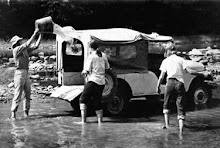Another thing I really enjoyed was tutoring at the Adult Learning Center. These were adults who were studying to earn their GEDs or get into selective programs in the local community college, aided by a new program funded with federal stimulus money. I ended up teaching a lot about math, even though I was initially a little afraid of the idea; how much did I remember my high school algebra and geometry? Yet I felt confident, when I realized that I did remember most of it quite well, and could tutor women in fractions and percents and factoring and word problems. Many of them had hard life stories also, often beginning with early marriage or pregnancy, and now with a return to school to earn a better livelihood. Some really tried hard, and wanted to be there; others wanted to play on the center’s computers and talk all day long. One woman struck me with her intelligence; she had graduated with a 4.0 from high school but had gotten married early and not gone on to further education because of caring for a child with special needs, and now she was so proud of her youngest daughter, who had earned the only full scholarship to University of Kentucky in the eighth grade.
I also truly explored the state that I was in. I went to Louisville to meet with my mentors and go to the Louisville Slugger museum, trendy Bardstown Road area, and the horse races at Churchill Downs. I went to Lexington, and saw a concert from a Tennessee band there. I went to Fort Knox and Elizabethtown and the Bourbon Trail. I went to the Natural Bridge State Park, and Daniel Boone National Forest, and the artisan centers of Berea. The Mary Breckinridge Festival, held annually in Hyden to celebrate Mary Breckinridge, founder of FNS and the third most famous nurse in history according to nursing students, took place the first weekend that I was in Kentucky. We served lunch at a community picnic, and quite literally the whole community turned up, a few bringing home food to feed the rest of their families, which was somewhat of a sobering thought. There was the parade through the streets of Hyden, with all sorts of quirky vehicles and participants, and a band, and fireworks, and food booths and monster trucks. It was an old fashioned but fun affair, although apparently I had just missed the Chicken and Black Gold festivals a few counties over.
All in all, I learned much from my time in Kentucky. I still have not been to the part of the state in the central time zone; I still have not been four-wheeling (although some of the other couriers did) or had any fried chicken here (although that is not likely to happen anytime soon). Yet I have gained much affection for a state I may otherwise have just overlooked on a map, with northern ignorance, as a flyover state and not worth my notice. I now have an attachment to the Bluegrass state, and bluegrass music has a place in my heart– and my playlist. I still feel like I could have done more for those people; or maybe my time was too short; but I did what I could in the time that I had, and I learned much that has furthered my interest in a career in nursing, and I guess in the end that is all one can hope for. I am looking forward to school again at Dartmouth, where I am preparing to take more nursing school prerequisites, explore more health and service-related extracurricular’s, and can hopefully bring my time in Kentucky to others by sharing my experience. I know that I will stop and think back on my experience every time I hear the song–
“A few more days for to tote the weary load,
No matter, 'twill never be light;
A few more days till we totter on the road,
Then my old Kentucky home, goodnight.” ~Stephen Foster
